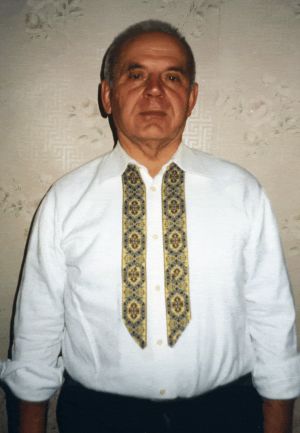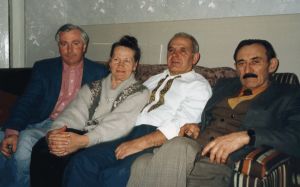DOHVALIUK, BORYS PETROVYCH (b. July 13, 1931, in the village of Kharkivtsi, Ostropil raion, Kamianets-Podilskyi oblast, now Starosyniava raion, Khmelnytskyi oblast). Participant in the dissident movement, an enlightener with the Prosvita society, a public and political figure, Doctor of Technical Sciences, professor. From a poor peasant family. In the spring of 1941, the family moved to the village of Druzhba, Shchors raion (now Krynychky raion), Dnipropetrovsk oblast.
In the famine year of 1946, the authorities confiscated the entire harvest from their garden plot. That year, Borys finished 6th grade and enrolled in Dniprodzerzhynsk Trade School No. 1. There, he was given 800 grams of bread, which he did not eat himself but brought home to his family, who were swelling from hunger. To survive, they returned to the Khmelnytskyi region. In 1947, his father was imprisoned for 7 years under the “Spikelets Law” for collecting ears of grain.
At the school, Borys remained silent for a year because he did not know Russian and was mocked. He worked as an electrician at the Prydniprovskyi Chemical Plant. He graduated from evening high school in 1951. He was involved in sports and became a pilot at an flying club, but he was not accepted into military school because his father was imprisoned. From 1951 to 1957, D. studied at the evening Dniprodzerzhynsk Metallurgical Institute. He joined the CPSU in 1955. After hearing materials from the 20th Congress criticizing Stalin’s personality cult at meetings, he began to show civic and political activism.
He produced a workshop wall newspaper with caricatures of the management and their mismanagement. The party organizer tore the newspaper down. In 1955, he married Yevhenia Krysa. His daughter Valentyna was born in 1956, and his son Vitaliy in 1960. With a degree in metallurgical engineering, he worked at the plant and from 1960 to 1981 at the Dniprodzerzhynsk branch of the Dnipropetrovsk Scientific Research Institute of Automation of Ferrous Metallurgy (NDIAChormet). He completed postgraduate studies by correspondence and defended his candidate's dissertation in 1966, “Establishing the interrelation between blast furnace process parameters for its automation.” He organized a laboratory for problems of blast furnace process automation and worked on his doctoral dissertation.
Once, while ill, he read the works of V. Lenin on the national question and got his laboratory colleagues interested in them. On the occasion of the 50th anniversary of Soviet power in Ukraine, he wrote a letter to the Verkhovna Rada of the Ukrainian SSR with a series of questions about the status of the Ukrainian language. The letter was signed by 6 engineers. They sent a similar letter to the newspaper “Pravda.” Rumors spread that a nationalist organization was active in the city. D. then prepared a letter to the district committee (raikom) of the CPU, requesting that a lecture on the issues raised in the letter be given to the collective. The lecturer could not handle the well-prepared audience, became indignant, and wrote a report to the raikom, stating that D. had organized nationalist questions and speeches. D. always behaved as a Ukrainian, defended his national dignity, and awakened it in others. Under his influence, many engineers switched to using the Ukrainian language.
In January 1968, O. Honchar's novel “The Cathedral” was published, which raised issues of ecology and the preservation of national spiritual values. D. promoted the novel among students. At a meeting of the district party activists, he asked a lecturer from Kyiv what specifically should be criticized in the novel. A raikom instructor, L. Rudin, wrote a denunciation: “Dohvaliuk forced a discussion on Honchar's ‘The Cathedral,’ thereby demonstrating a distorted understanding of our reality.” The denunciation was signed by 30 communists from organizations unknown to D., who had not heard the conversation. In June 1968, a party meeting at NDIAChormet considered D.’s personal case. The district committee members arrived wearing “stalinkas” [a term for long, dark coats worn by party officials], and a member of the raikom commission, Chyrhynets, declared: “Dohvaliuk is connected with foreign intelligence agencies and is conducting anti-state, anti-party propaganda under their leadership—he must be expelled from the party.” The meeting voted “in favor.” Almost the entire automation department of the institute, over 50 people, appealed to the city party committee with a letter in defense of D. Due to the entry of Warsaw Pact troops into Czechoslovakia on August 21, 1968, internal repression intensified. The bureau of the city committee, and later the oblast committee, confirmed the expulsion.
He appealed to the Central Committee of the CPSU and to the 24th, 25th, and 26th Congresses, but to no avail. D. was forbidden to lead the laboratory or any collective and was barred from teaching. In 1981, he was dismissed from NDIAChormet. He worked as a senior researcher in the research sector of the Dniprodzerzhynsk Industrial Institute (now a State Technical University), and was later appointed and elected as an associate professor (dotsent). Party commissions sought to strip D. of his scientific degree. At work, D. was under constant surveillance, but they had to reckon with him as a competent head of major scientific projects. He often traveled on business trips. Through V. SIRENKO and M. KUCHER, he met I. BROVKO, V. SKRYPKA, and O. MESHKO, and in 1975, B. ANTONENKO-DAVYDOVYCH, with whom he became friends and whom he helped financially.
After Yevhen SVERSTIUK's release, he also communicated with him. These were risky acquaintances: on one occasion, he was detained along with V. SIRENKO while driving away from O. MESHKO’s home. However, he never avoided such meetings. He would visit Taras Shevchenko's grave on March 9 and May 22 and participated in trips to Zakarpattia. In 1988, he appealed to the 19th Party Conference. The Central Committee of the CPU reinstated D. in the party. However, on June 4, 1990, he left the CPSU, motivating his decision by the fact that the party leadership had not condemned all the crimes committed over 73 years and had not repented before the people. By that time, a core of nationally conscious intelligentsia had formed in Dniprodzerzhynsk. On March 3, 1989, on D.’s initiative, the constituent meeting of the Ukrainian Language Society was held at the Industrial Institute. D. chaired the meeting and delivered a report.
In June, at the city conference, he was elected head of the local branch of the Ukrainian Language Society (TUM), which he led until 1993. The society insisted that instruction in schools, secondary and higher educational institutions, and upbringing in kindergartens and nurseries be conducted in Ukrainian. D. himself, at least, began teaching exclusively in Ukrainian in 1990, and his students and postgraduate students write their coursework, theses, and dissertations in Ukrainian.
In 1994, he defended his doctoral dissertation, “Development of the foundations of the theory of blast furnace process control based on created algorithms and automated systems.” D. is one of the organizers of the People’s Movement of Ukraine (NRU) and was a delegate to its 1st, 2nd, and 3rd congresses. For a long time, he headed the city organization of the Ukrainian Republican Party (URP).
Since 1981, he has been an associate professor (dotsent), and since 1994, a professor at the Department of Automation and Industrial Electronics (now the Department of Electronics and Automation).
He is the author of over 200 scientific works, including articles, books, monographs, textbooks, and manuals.
Bibliography:
I. “My meetings with Ivan Brovko.” // *Dobrom nahrite sertse. Do 90-richchia I.B. Brovka* (A Heart Warmed by Kindness. On the 90th anniversary of I.B. Brovko) / Kharkiv Human Rights Protection Group; art design by B. Zakharov, ed. by V. Ovsienko. – Kharkiv: Folio, 2005. – pp. 114-117.
II. KhPG Archive: Interview with B. P. Dohvaliuk by the Kharkiv Human Rights Protection Group on April 1, 2001, in Dniprodzerzhynsk: https://museum.khpg.org/1183582482
*Mizhnarodnyi biohrafichnyi slovnyk dysydiv krajin Tsentral'noyi ta Skhidnoyi Yevropy y kolyshnoho SRSR* (International Biographical Dictionary of Dissidents of the Countries of Central and Eastern Europe and the former USSR). Vol. 1. Ukraine. Part 1. – Kharkiv: Kharkiv Human Rights Protection Group; “Prava Lyudyny,” 2006. – pp. 1–516; Part 2. – pp. 517–1020; Part 3. – 2011. – pp. 1021-1380. – Dohvaliuk, pp.: 1111-1113: https://museum.khpg.org/1183322329
*Rukh oporu v Ukraini: 1960–1990. Entsyklopedychnyi dovidnyk* (The Resistance Movement in Ukraine: 1960–1990. An Encyclopedic Guide) / Foreword by Osyp Zinkevych, Oles Obertas. – Kyiv: Smoloskyp, 2010. – 804 p., 56 ill.; Dohvaliuk: pp. 212-213.; 2nd ed., 2012. – 896 p. + 64 ill.; Dohvaliuk: pp. 233-234.
Vasyl Ovsienko, Kharkiv Human Rights Protection Group. June 29, 2007. Last proofread May 16, 2016.

